Related Research Articles
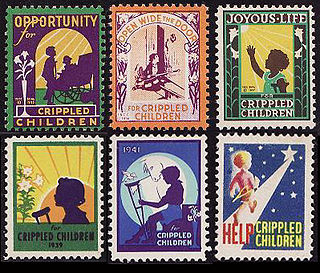
In philately, a cinderella stamp is "virtually anything resembling a postage stamp, but not issued for postal purposes by a government postal administration". The term excludes imprinted stamps on postal stationery.

The Cinderella Stamp Club was founded on 5 June 1959 in London, England, and is an association of philatelists, amateur and professional, whose interests lie in local stamps, telegraph stamps, railway stamps, revenue stamps, fiscals, forgeries, bogus and phantom issues, Christmas, Red Cross, TB and other charity seals, registration labels, advertisement and poster stamps and many other items - all of which are the so-called "Cinderellas of Philately".

L.N. and M. Williams were a philatelic writing partnership made up of brothers Leon Norman Williams and Maurice Williams (1905–1976).

The poster stamp was an advertising label, a little larger than most postage stamps, that originated in the mid-19th century and quickly became a collecting craze, growing in popularity until World War I and then declining by World War II until they were almost forgotten except by collectors of cinderella stamps.

This is a survey of the postage stamps and postal history of Ghana, known as the Gold Coast before independence.

The British Library Philatelic Collections is the national philatelic collection of the United Kingdom with over 8 million items from around the world. It was established in 1891 as part of the British Museum Library, later to become the British Library, with the collection of Thomas Tapling. In addition to bequests and continuing donations, the library received consistent deposits by the Crown Agency and has become a primary research collection for British Empire and international history. The collections contain a wide range of artefacts in addition to postage stamps, from newspaper stamps to a press used to print the first British postage stamps.
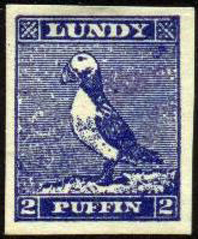
The Chinchen Collection is a collection of stamps, proofs, artwork and covers from Lundy Island donated by Barry Chinchen to the British Library Philatelic Collections in 1977 and is located at the British Library.

The Tapling Collection of postage stamps was donated to the British Museum from the estate of Thomas Tapling in 1891.

The Mosely Collection of British Africa stamps dating to 1935 was formed by Dr Edward Mosely of Johannesburg, South Africa. The collection was donated to the British Museum by his daughter, Kathleen Cunningham, in 1946 and is now held as part of the British Library Philatelic Collections. After the Tapling Collection, this is considered the Library's most important philatelic acquisition due to the number of countries represented and the number of unique items included.
The Universal Postal Union Collection is a deposit by the General Post Office (GPO) in the United Kingdom, under section 4 of the Public Records Act, of its duplicate Universal Postal Union collection of 93,448 stamps, covering the period from 1908.
The Foreign and Commonwealth Office Collection was formed by instruction from the Secretary of State for the Colonies on 23 April 1890 to all territories under his authority. The intention was to have a record of all Colonial Postage and revenue stamps, postcards, embossed envelopes and newspaper wrappers. The collection contains single examples of the stamps in use at that time as well as some obsolete issues and single copies, usually from first printings, from 1890. Variations such as colour varieties and alternate watermarked papers are included.
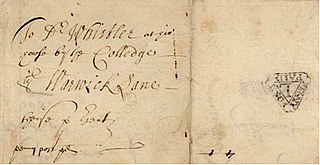
The Fletcher Collection is Hugh Greenwell Fletcher's lifetime philatelic collection of British postage stamps and British stamps used abroad including overprints and non-stamp items such as postal stationery. On his death in 1968, the collection was bequeathed to the Bruce Castle Museum in Tottenham, once the home of Sir Rowland Hill. The collection was donated to the British Library in 1989.
The Fitzgerald Collection is an extensive philatelic collection of air mail stamps donated to the British Library and announced in 1951.

A savings stamp is a stamp issued by a government or other body to enable small amounts of money to be saved over time to accumulate a larger capital sum. The funds accumulated may then be used to make a larger purchase such as taking out a savings bond or to pay a large upcoming bill. Often issued in conjunction with post office run savings banks, savings stamps have also been issued by private companies. Supermarkets have issued the stamps to enable the spreading of large bills, package holiday companies have used them to enable customers to save for an annual holiday, and utilities companies have used the stamps to enable customers to spread the cost of their bills.

The Contributions Agency Collection is a collection of British National Insurance stamps that forms part of the British Library Philatelic Collections.
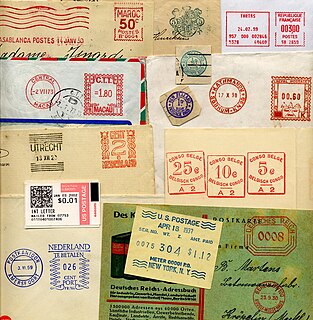
The McInroy Collection is a collection of meter stamps of Great Britain and the world up to 2003 that forms part of the British Library Philatelic Collections. It was formed by Dr R. McInroy and donated to the Library in 2004. As of March 2007 it comprised 116 boxes of material but with much duplication.
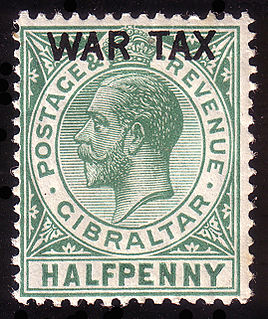
The Wilson-Todd collection is a collection of postage stamps issued during, or associated with, the First World War, including many war tax stamps, that forms part of the British Library Philatelic Collections. It was created by James Wilson-Todd and donated to the British Museum by his mother Lady Wilson-Todd after his death. As of April 2008 it was held in one box.
The Imperial War Museum stamp collection is a collection of postage stamps issued during, or associated with, the First World War that is on loan from the Imperial War Museum to the British Library philatelic collections. The collection is rich in material from the former Ottoman Empire. As of October 2007 it consisted of 13 large boxes and a book, Imperial War Museum Stamp Collections by Country, that lists the items held.
The Turner Collection of Forgeries is a collection of forgeries of postage stamps of the world to about 1900 that forms part of the British Library Philatelic Collections. It was formed by S.R. Turner and donated in 1973. It is held in five numbered boxes and contains a few genuine stamps for comparison.
The Kay Collection is a collection of revenue stamps of the British Commonwealth to 1940 that forms part of the British Library Philatelic Collections. It was formed by A. B. Kay and originally donated to the British Museum by Kay's children Miss Nora Kay and Mr F. R. Kay in 1949. As of October 2007 it was held in eight boxes and 20 loose-leaf folders.
References
- ↑ Martin, Jeremy, & John Powell. (2010) West Africa in the British Library Philatelic Collections. Dronfield: West Africa Study Circle. p. 117. ISBN 9781905647040
